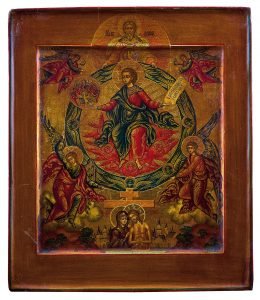 It has been traditional to speak of Basil as initially a Homoiousian. Truly this requires qualification. Basil does seem to have had some personal connection with Basil of Ancyra and he was strongly opposed to the 360 Homoian creed at the time of its promulgation. However, we never encounter Basil as a partisan for a distinct Homoiousian party and his attitude to the phrases used to describe its position. People in this party held that God the Father and God the Son are of like but not identical substance. Basil’s early position is most comprehensible, first, against the background of the plurality of strands of opinion that broadly supported Homoiousian theology in the late 350s and, second, against the background of the realignment of the early 360s. Theology was in flux during these years. Theologians were desperately attempting to formulate the Church’s position on Who Jesus Is, especially in light of Nicaea which, as we know, was not, because it introduced new terminology to explain Christ, as sharply defined as it could be. If it is true that there were some among the Homoiousians who saw themselves as upholding the basic sense of Nicaea itself despite worries about its terminology, then we can easily imagine Basil in this company. Through the 360s and especially in the 370s we see him gradually distancing himself from those who refused to travel his road towards pro-Nicene theology. Nevertheless, in the early and mid-360s we still find Basil discussing theological topics with those whom we can broadly term Homoiousian. We may even think of Basil’s major dogmatic work, the Contra Eunomium, as the logical conclusion of one strand of Homoiousian theology.
It has been traditional to speak of Basil as initially a Homoiousian. Truly this requires qualification. Basil does seem to have had some personal connection with Basil of Ancyra and he was strongly opposed to the 360 Homoian creed at the time of its promulgation. However, we never encounter Basil as a partisan for a distinct Homoiousian party and his attitude to the phrases used to describe its position. People in this party held that God the Father and God the Son are of like but not identical substance. Basil’s early position is most comprehensible, first, against the background of the plurality of strands of opinion that broadly supported Homoiousian theology in the late 350s and, second, against the background of the realignment of the early 360s. Theology was in flux during these years. Theologians were desperately attempting to formulate the Church’s position on Who Jesus Is, especially in light of Nicaea which, as we know, was not, because it introduced new terminology to explain Christ, as sharply defined as it could be. If it is true that there were some among the Homoiousians who saw themselves as upholding the basic sense of Nicaea itself despite worries about its terminology, then we can easily imagine Basil in this company. Through the 360s and especially in the 370s we see him gradually distancing himself from those who refused to travel his road towards pro-Nicene theology. Nevertheless, in the early and mid-360s we still find Basil discussing theological topics with those whom we can broadly term Homoiousian. We may even think of Basil’s major dogmatic work, the Contra Eunomium, as the logical conclusion of one strand of Homoiousian theology.
Basil’s early theological corpus reveals a thinker in constant development. This is clearly demonstrated in an early correspondence with Apollinaris of Laodicea, which is probably dated around 360-361. Basil wrote to Apollinaris, asking how to interpret homoousios.
By the way, I purposely include words like homoousios so that my readers might become acquainted with the real struggle that the Fathers of the Church had in finally crafting our present understanding of Who Christ Is and, eventually, Who God Is. It is critical that the appropriate words are used since they signify our belief with regard to Christ and God, the Holy Trinity.
